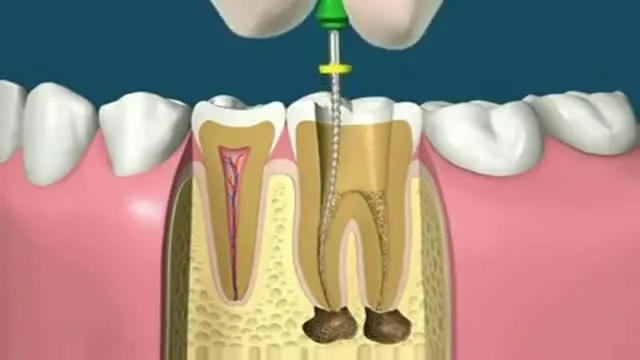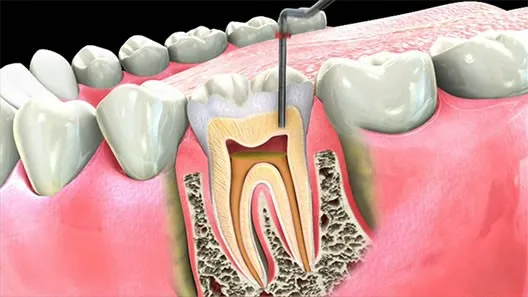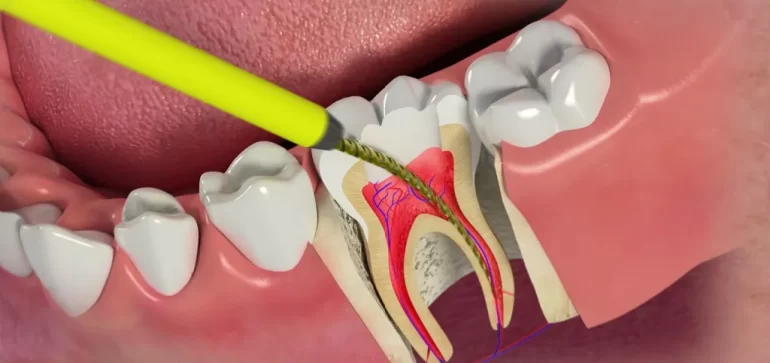In this article, from Mehr Shariati Dental Clinic, we are going to talk about tooth extraction, all the cases leading to tooth extraction, after care and… Provide explanations. So follow us to the end of our article.
Tooth extraction is a treatment method that is usually performed in case of deep tooth decay and infection in the internal tissues of the tooth. The main goal of this method is to eliminate bacteria and infection and save the tooth from the removal of its biological components.
Tooth denervation steps
- Examination and diagnosis: The dentist first examines the impacted tooth and if deep tooth decay and the presence of infection are confirmed, nerve extraction is suggested.
- Abrasion: Using a mixture of abrasion (prepared that contains tooth preparation elements), the dentist prepares the tooth to perform the denervation procedure.
- Tooth drilling: In this step, the dentist, using special tools, drills the rotten part of the tooth (rotten tooth) and accesses the tooth nerve.
- Removing the nerve: the dentist completely removes the tooth nerve from inside the tooth.
- Cleaning and disinfection: the dentist cleans the tooth with antibacterial substances and prevents infection.
- Filling the nerve canal: after denervation of the tooth, the nerve canal is filled and finally the tooth is packed with special materials.
The steps of tooth extraction are completely performed by a specialized and experienced dentist. After denervation, the decayed tooth must be strengthened with a dental prosthesis or dental restoration to function properly and prevent new infection.
When is debridement done?
Tooth extraction is generally performed in cases where deep tooth decay and infection have occurred to the internal structures of the tooth (nerve and root). Cases that require nerve extraction:
- Severe pain: If the tooth is in severe and persistent pain and the usual medical treatments have not been able to reduce the pain, there may be a need for denervation of the tooth.
- Decayed and destroyed tooth: If the tooth is severely decayed and destroyed and part of the nerve is also damaged, nerve extraction may be necessary.
- Accidents and injuries: If a tooth is damaged that damages the nerve and root of the tooth, it is necessary to perform nerve extraction.
- Inflammation around the tooth: Inflammation around the tooth that penetrates the nerve of the tooth may need nerve extraction.
In any case, dental denervation is performed by a specialist dentist. If you feel that your tooth needs a nerve extraction, it is better to visit your dentist immediately so that the condition of your tooth can be evaluated and the appropriate treatment can be determined for you.

Durability of denervated tooth
It depends on various factors and the duration will be different based on your care and tooth condition. By denervation of the tooth, the tooth is freed from the sensitive nerves and although the tooth can still remain in a complete appearance, it loses sensitivity to pain and temperature.
Usually, by performing nerve extraction and tooth restoration, the tooth can be saved for a long time. However, regular oral care and regular visits to the dentist are needed to maintain the longevity of the denervated tooth and prevent new problems. Things to increase the longevity of denervated teeth:
- Regular oral care: careful and regular brushing, flossing and using mouthwash to maintain oral hygiene and prevent the accumulation of bacteria around teeth and dentures.
- Regular visits to the dentist: visiting the dentist regularly for necessary examinations and repairs, as well as ensuring the health of the teeth and prostheses.
- Avoiding excessive pressure and arching: Avoiding harmful habits such as arching, grinding your teeth and using hard objects.
After-care after denervation is very important to support faster healing and longevity of denervated teeth.
Some cases of care after tooth extraction
- Pain and swelling: After nerve extraction, there may be pain and swelling in the tooth and the surrounding area in the early days. Regular use of medications prescribed by the dentist and using ice as a cooling pad can help reduce swelling.
- Oral care: pay attention to regular oral care after dental nerve extraction. Including careful and regular brushing, using dental floss and mouthwash, all of which are aimed at maintaining oral hygiene and preventing the accumulation of bacteria around teeth and dentures.
- Food restrictions: In the early days after nerve extraction, you can use soft and cool food to avoid clumsiness for the operative area of the tooth.
- Use of drugs: In cases where the dentist prescribes anti-inflammatory or pain-relieving drugs, use the drugs carefully and follow the dentist’s instructions.
- Visiting the dentist: Regular visits to the dentist for necessary examinations and adjustments, as well as to ensure the health of the teeth and prostheses.
- Avoiding too much pressure: Avoiding too much pressure on teeth and prostheses, preventing arching and teeth grinding.
Denervated toothache
It is usually related to various factors and in some cases it is normal. Some possible reasons for tooth pain after nerve extraction are:
- Post-operative inflammation: After nerve extraction, the area around the tooth may temporarily be inflamed or swollen, which can lead to pain. This pain usually decreases gradually in the first few days after the operation.
- Incomplete denervation: In some cases, the denervation is not complete and a part of the nerve remains, which can lead to pain and sensitivity.
- Stimulated around the nerve extraction: After a tooth extraction, the area around the extraction site may become irritated, leading to temporary pain.
- Post-operative infection: In rare cases, a new infection may develop after a tooth extraction, leading to pain and swelling.
If you have severe pain after the nerve extraction procedure, it is better to inform your dentist so that he can be examined and the necessary treatment can be done. The dentist can diagnose the cause of the pain and determine the most suitable solution for you.

Infection of denervated tooth
Infection of a denervated tooth is a rare event, but in some cases it may occur. Some of its reasons are:
- Incomplete denervation: In some cases, the denervation of the tooth is incomplete and a part of the nerve remains, which can lead to infection.
- Previous infection: If the tooth had an infection before the tooth extraction, it is possible that a new infection will occur after the extraction.
- Defects in treatment: In some cases, bacteria and infections may be given a chance to return and promote infection due to a defect in denervation treatment or tooth restoration.
If you have symptoms of a tooth infection, such as severe pain, swelling, sensitivity to pressure or temperature, it is best to visit your dentist. The dentist can diagnose the cause of the infection and determine the appropriate treatment for you by conducting the necessary examinations and tests. If an infection is detected, it may be necessary to take antibiotics or repeat the debridement procedure to control the infection and allow for healing.
Emergency denervation
It refers to an operation that shows the need for urgent tooth extraction due to severe pain or severe tooth infection. This type of debridement is usually done in cases where the condition of the tooth is very critical and a delay in treatment can lead to more serious problems.
Cases that may require emergency debridement
- Severe and persistent pain: If your tooth is in severe and persistent pain and the usual medical treatments have not been able to reduce the pain, you may need emergency debridement.
- Severe infection: If the tooth is severely infected and swollen and your condition requires immediate discharge, emergency debridement is performed.
- Accidents and injuries: If there is an injury to the tooth that damages the nerve of the tooth and you need immediate treatment, emergency nerve extraction is performed.
last word
After the denervation of the tooth, the decayed tooth must be strengthened with a dental prosthesis or dental restoration to function properly and prevent new infection. Also, regular oral care and regular visits to the dentist for check-ups after nerve extraction are very important.

